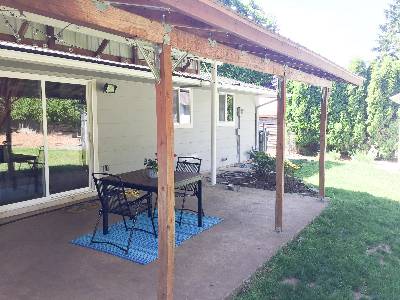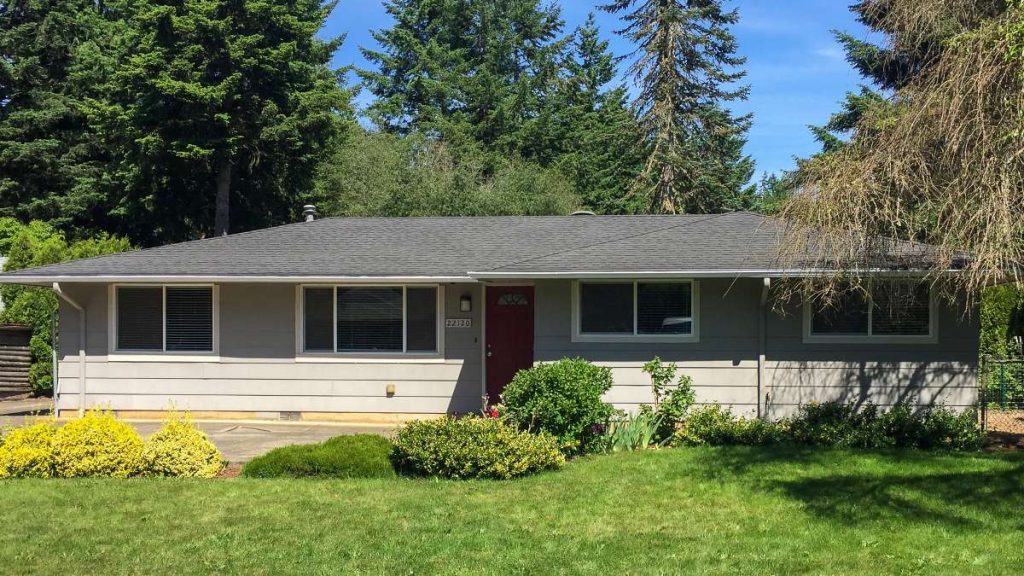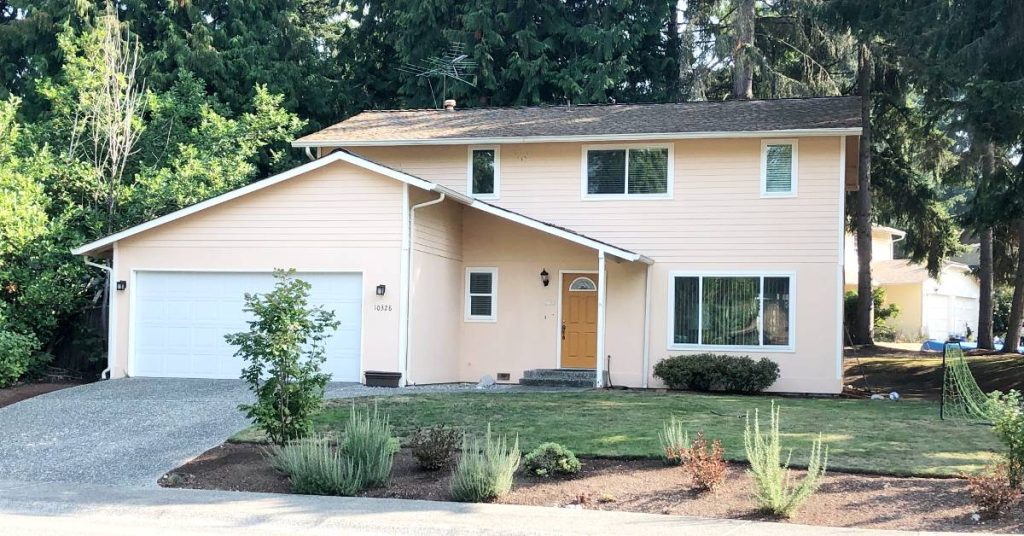When I bought my first rental property (the one pictured above), my brother and I saved nearly $20,000 by conducting the sale ourselves. Here’s how you can do it, too.
How we saved nearly $20,000
When my brother was planning on selling his home, I offered to purchase it as an investment property.
His agent was going to list it for $319,000.
When you sell a home, you typically spend 6% of the home’s price on agent commissions. In this case, that would be $19,140.
Because there would be no agent, my brother dropped the price to $310,000. In addition, he would net an extra $10,000 from the sale. It was a huge win-win. But how were we confident that we could do all the legal stuff, title, escrow, loan approvals, etc. with no agents involved?
Luckily, I had helped hundreds of people buy homes as well as purchased and refinanced homes many times. I was confident I could figure this out. Here’s what I did.
See if you’re eligible to buy a home from a family member.
1. Work up a purchase contract
Purchase contracts are usually lengthy because both the buyer and seller want to protect themselves.
That’s smart. There are a lot of elements to purchasing a home. But you can probably handle working up the official purchase contract on your own.
For my transaction, the escrow company had a For Sale By Owner template that we could use. It was really simple to fill out and there were no arguments as to who pays for what or what is left in the property.
If your escrow company doesn’t offer that, there are resources online where you can purchase a template. Alternatively, you can hire a lawyer who can draft an agreement much cheaper than hiring an agent.
Be sure you work from a state-specific purchase contract, since each state has specific items the document needs to cover.
No matter how good the agreement, though, keep in mind that there needs to be a degree of trust between you and your family member. A free template may not cover every possible circumstance, so agree with your relative to work out unexpected events during the sale.
Start your home purchase pre-approval.
Purchase Contract Tips
Deciding on a price: In my case, an agent mentioned a price she would list it for before my brother knew he would sell the home to me. So for us, it was easy. We took that price and backed out agent commissions. But if you don’t plan to use an agent, don’t request a price opinion from one unless you’re upfront that you won’t be using them. Start with a conversation with your relative and see if they have a price in mind. If you agree, you’re done. You may both decide to set a preliminary price, then see what the appraisal says. The appraisal may not be helpful, though. The appraiser needs to see the intended purchase price and contract to do the appraisal. Then, he or she more or less tries to match that price with comparables. So the price you set will be the basis of the appraiser’s opinion.
Earnest money: Your relative likely won’t require earnest money. That’s a deposit upfront that shows the seller you’re serious. This amount is applied to your down payment and closing costs when the transaction closes. But it’s okay to have zero earnest money in this case.
Closing date: You have to put a closing date on the contract. But the beauty of buying from a family member is that they won’t take your earnest money for missing the closing date. Still, come to an agreed-upon date.
Fees: Each state has its own customs on who pays what fee. Your relative should pay their share of the title and escrow fee that is customary for the seller. Decide who pays things like existing levies on the home, past HOA dues, and other fees that may transfer to the new owner.
Seller’s property disclosure: This is required as part of the purchase contract in many states. You may already know all existing issues with the home, but your relative will still have to disclose them to you formally on this document.
2. Make sure your lender can do a non-arms-length transaction
Buying a house from someone with whom you have a pre-existing relationship is called a non-arms-length transaction.
This simply means that there are more factors at play than simply a seller selling to a buyer.
The price might be lower than market value, such as when I purchased the home for $9,000 under market value.
Some lenders and loan programs do not allow non-arms-length transactions. If they do, the loan may come with more requirements.
A good next step after you’ve confirmed your family member will sell to you is to get a pre-approval from a lender. Physically call a loan officer and say “I’m planning to buy a house from my [brother, parents, aunt, etc.]. Do you allow non-arms-length home purchases?” Don’t try to apply online first – the computer system might not ask if it’s non-arms-length, then your approval may be invalid.
A good old-fashioned conversation with an expert is the best way to go.
Once you have your pre-approval, your lender will order an appraisal and request all income and asset documentation that they need from you.
Start your non-arms-length home purchase here.
I’m proof that you can buy a house from a family member with no agent. Here’s the home I was able to purchase. A real gem.






3. Open title and escrow
Most homebuyers don’t know they can request their own title report and escrow service, even if they’ve purchased many homes. That’s because their agent does it on a purchase transaction and their lender does it for a refinance.
Title and escrow are just like any other service. You can look up a title company in your area and say “I’m purchasing a home from my relative and I’d like to order a title report and open escrow.”
Another cheaper alternative to title is an Attorney Opinion Letter (AOL).
Find a company that handles both title and escrow (there are some independent escrow companies out there, but you want one that can do title, too).
Some common companies are First American Title, Chicago Title, and Stewart Title, but there could be local companies that handle both jobs.
The title company (or attorney if getting an AOL) scans public records for existing liens and property right claims on the home you’re buying. The lender requires this.
Escrow is the process of taking in and distributing all money involved in the transaction. This company also handles getting final loan documents and necessary documents from the seller signed.
4. Complete the loan process
Follow through with any remaining lender requirements.
The lender may ask you for additional pay stubs, bank statements, or letters of explanation regarding past credit issues.
Promptly get them everything they need until you have a “clear to close” approval.
This just means that all loan requirements are fulfilled and all parties can sign final paperwork.
5. Close the transaction
The last step in the process is to sign the final loan documents. Your lender will send about 100 pages of documents to your chosen escrow company. An escrow agent or traveling notary will assist in signing all the paperwork.
Your relative will sign seller paperwork in a separate appointment. Escrow will set this up with them.
When you’re all done signing, the escrow company will send all signed documents back to the lender, which will determine the funding date, or the date that the transaction can officially close.
Be on call the day of funding. Escrow may have missed a signature or the lender may need a final piece of paperwork that they overlooked during the initial process. Anything can happen on funding day.
If all goes as planned, the loan will close and the escrow company will record new ownership of the home with the county. You are now the new owner of your relative’s home.
One final note: consider requesting a gift of equity
If your relative would like to assist in your homebuying adventure, there are a couple ways to do it:
- Lower the purchase price
- Offer a gift of equity
We already talked about how they can lower the purchase price. However, if you don’t have down payment funds, lowering the price alone won’t help.
The lender will still require a certain percentage of the lowered purchase price for the down payment.
For example:
| Down payment (5%) | ||
| Market value | $300,000 | $15,000 |
| Discounted price | $270,000 | $13,500 |
In this case, you’re getting a lower price, which amounts to a lower payment and less money owed. But it doesn’t reduce your upfront cost much.
Rather than lowering the price, your relative could offer a “gift of equity.” This is like a cash gift where no actual cash is exchanged. Rather, the seller grants you part of the home’s equity as a gift.
Gift of equity example
| Market Value | $300,000 |
| Sale price | $300,000 |
| Gift of equity | $30,000 |
| Down payment equivalent | 10% |
| Cash down payment needed for 10% down program | $0 |
In this example, the lender considers the gift of equity as part or all of your down payment. Escrow will add the equity gift to the closing cost estimates as if it were cash. The end result is that the cash you must bring in to close is reduced by the amount of the gift of equity.
Get help with your home purchase using a gift of equity.
How to buy a house from a family member: You can save money doing it yourself
Don’t be afraid to buy a home from parents, a sibling, or another relative without the help of an agent.
An agent is way overkill in most of these situations. An agent is there to match a seller to a buyer, and you already have both. And the purchase contract can be simple, considering there’s already trust between both parties.
You are able to do this. Just take the first step and you’ll be surprised. And your bank account will thank you!




